Baykar, the Turkish defense company renowned for its advanced unmanned aerial vehicles (UAVs), has announced that it had delivered at least two Bayraktar Akıncı (Raider) twin-engine UAVs to the United Arab Emirates (UAE).
Baykar’s announcement on January 1 came as part of its year-end statement, listing major achievements for 2024. According to the statement, one Akıncı was delivered to the UAE in January 2024, while another was delivered in December 2023.
Unlike other deliveries mentioned in the statement, Baykar did not release any images of the Akıncı UAVs in the UAE, maintaining a degree of secrecy around the deployment of the advanced UAVs.
The UAE’s acquisition of the Akıncı drones had not been previously officially disclosed. However, Haluk Görgün, President of Türkiye’s Defence Industry Agency, hinted at the deal in October 2023, stating that Turkish-Emirati collaboration on UAVs—including the Bayraktar Akıncı and the Bayraktar TB2—had reached unprecedented levels in both quality and quantity.
The deal was a key development in strengthening the defense relationship between Turkey and the UAE. Baykar also highlighted its growing strategic partnership with the UAE’s EDGE group.
As part of this alliance, the two sides carried out test-firings of the Desert Sting 16 small guided bomb in January 2024. The test, which took place in Turkey, involved the Desert Sting 16 being dropped from a Bayraktar TB2 UAV.
Last year, EDGE also revealed plans to integrate its missile systems onto US-made MQ-9B UAVs, an initiative first disclosed by General Atomics in late 2023.
The deal for Turkish UAVs with the UAE was part of a broader US$2 billion agreement first reported in 2022. The initial reports suggested that the UAE was negotiating the purchase of 120 TB-2 drones.
However, it was later revealed that Abu Dhabi was set to receive 60 units of each, the Bayraktar TB2 and Bayraktar Akıncı.
Baykar’s end-of-year statement also confirmed that the company had delivered Bayraktar Akıncı drones to Pakistan in July and Azerbaijan in November 2024. Both countries had previously confirmed receiving the advanced UAVs, which were showcased in photographs released by Baykar.
Interestingly, the statement made no mention of deliveries to Burkina Faso or Mali, despite the fact that both countries had publicly displayed the Akıncı drones in 2024.
Burkina Faso’s president officially handed over at least two Akıncı UAVs to its military in April, while Mali showcased two Akıncı drones in November. Although not highlighted by Baykar, these deliveries point to the growing demand for Turkish-made drones in different regions.
UAE Military Expands And Strengthens Its Unmanned Aerial Systems Fleet
The United Arab Emirates (UAE) has solidified its position as one of the most active buyers of unmanned aerial vehicles (UAVs). In recent years, the UAE is believed to have placed orders for approximately 500 UAVs, a considerable number reflecting its ambition to bolster its military capabilities.
Among the major acquisitions, the UAE has secured 60 Bayraktar TB2 medium UAVs and 60 Bayraktar Akıncı heavy UAVs from Turkish defense company Baykar.
Additionally, the country has signed deals with Swiss-headquartered Anavia to supply 200 rotorcraft UAVs. During the Dubai Airshow in November 2023, it was announced that the UAE-based EDGE had also received an order for 100 Reach-S UAVs.
Over the past decade, the UAE has relied on various platforms, including the General Atomics RQ-1 Predator, delivered almost a decade ago, and a good number of Chinese-built drones.
However, with the introduction of Turkish UAVs, there are indications that some of the older Chinese systems may soon be phased out in favor of more reliable and advanced platforms from Turkey.

There have been frustrations with the reliability of Chinese platforms. For example, Iraq grounded much of its Chinese-made UAV fleet due to technical issues, prompting a reassessment of these drone’s reliability.
This shift towards Turkish drones also comes as the US has struggled to meet the rising demand for advanced UAVs in the Gulf region. Concerns over the Missile Technology Control Regime and political considerations have made the transfer of sophisticated UAV technologies slower and more complex.
In 2020, the United States approved the potential sale of MQ-9B UAVs to the UAE, along with associated weapons, in a deal valued at nearly US$3 billion. However, the process of finalizing this deal has been slow, and even after several years, it remains incomplete.
On the other hand, the Turkish UAVs, in particular the Bayraktar TB2, have gained major traction due to their proven operational success in conflict zones like Libya, Azerbaijan’s Nagorno-Karabakh conflict, and Ukraine.
These drones have changed modern warfare and have proved effective in reconnaissance, surveillance, and precision strikes. Turkish UAVs are also more readily available, with Baykar’s ability to quickly deliver equipment, giving it an advantage over other suppliers, including the US.
